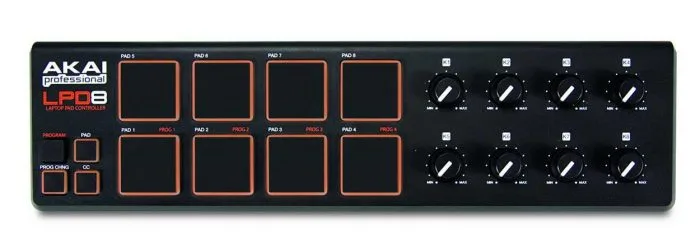I recently had a need for an affordable, easy to use, portable MIDI controller. Not because I travel a lot, or that I’m short on space in my studio… I just wanted to allow my 2-year old boy to join me in making noise, without him having to use the more complicated and expensive controllers in my setup.
My first thought was the Akai MPD18, but some people recommended the LPD8 instead, a small controller with 8 pads and 8 encoders.
The LPD8 laptop pad controller is a USB-MIDI controller for musicians, producers, DJs and other music creators. It measures less than 13 inches across and weighs less than a pound to easily fit into a laptop case, backpack or messenger bag for extreme portability.
At around 30 by 8 centimeters in size, the LPD8 sure is portable. It weights a little over 300 grams, which is nice and lightweight, but not too flimsy. It feels rather solid and sturdy.
The pads are velocity sensitive, though I found it a bit hard to get low velocity hits. The pads require quite a bit of force to register a hit. No problem for my son who prefers bashing over tapping, but personally I would prefer a lighter touch similar to the pads on Native Instruments Maschine. I have found some information online on increasing sensitivity by putting some electric tape under the pads. I might have a go at that.
The knob response is quite smooth, and distance between individual knobs is good for me. Normally I don’t need that many knobs (typically just cutoff/freq) but having 8 can be a great thing. Take Turnado. Having 8 knobs & pads on the LPD – to turn the big knobs and (de)activate the fx slots – is just perfect for turning Turnado into a live performance instrument.
Of course you can use the LPD8 to control anything you want by using MIDI learn to assign parameters to controls, or by selecting one of the 4 user configurable presets. The editor software is pretty straightforward.
The pads can transmit MIDI note, Program Change, and MIDI CC data. The knobs send MIDI CC data; low and high data values can be set for each knob (270 degree rotation).
Presets are fetched from and stored on the LPD8 as well as on your computer, so you can create a library of presets larger than the 4 slots available on the LPD. The “program” button on the LPD allows you to change presets, “prog chng” and “cc” buttons put the pads in respective modes. The “pad” button switches the pads to send out MIDI notes. The MIDI channel to be used is also stored in the presets.
Furthermore, pads can be set to be momentary (only active when held) or toggle.
So what do I think?
Format: USB MIDI controller
Price: 49 EUR
Like: Portable, quality hardware, affordable
Don’t like: Pad sensitivity
Verdict: 8/10
Notwithstanding its size, the LPD8 is a respectable controller. I kind of expected it would have a bit of a rinky-dink toy-like feel to it, so I was surprised to find it actually has a decent build quality. I have not yet dropped it, but I think it could take a reasonable amount of abuse without breaking. I feel comfortable taking this thing on the road.
What else can I say? The controller delivers exactly what it says on the package. An ultra portable USB controller with 8 pads and 8 knobs, 4 user programs, and a software editor.
I quite like the design, and the orange backlit pads are lovely to my eye. I only wish they would be a little more responsive. YMMV.
In short, the LPD8 is a good quality, affordable portable controller. Suitable for children of 2+ years old (and their mums & dads).
More information: Akai Professional / LPD8
 Save up to 95% in Plugin Boutique's Spring Sale!
Save up to 95% in Plugin Boutique's Spring Sale!




